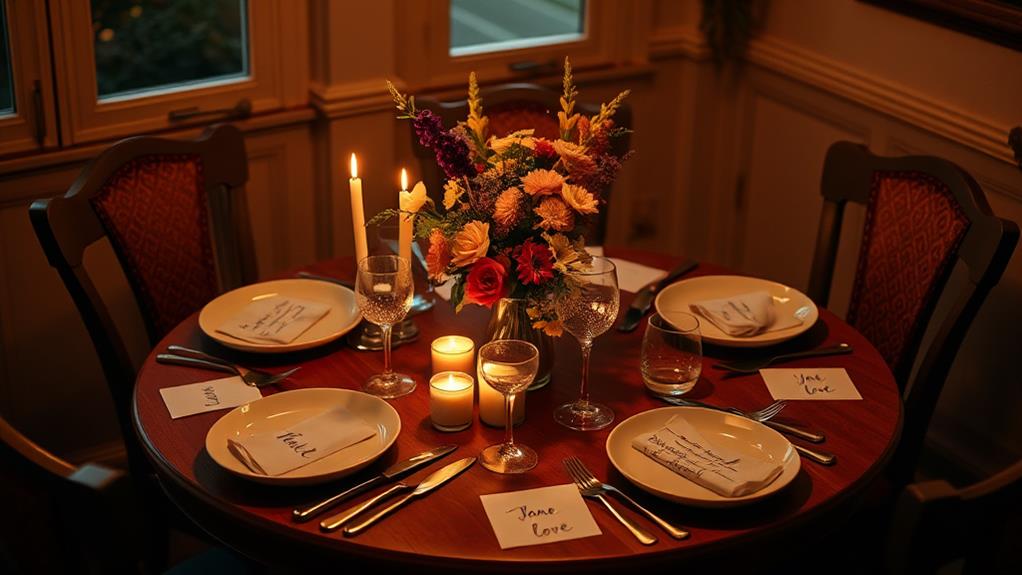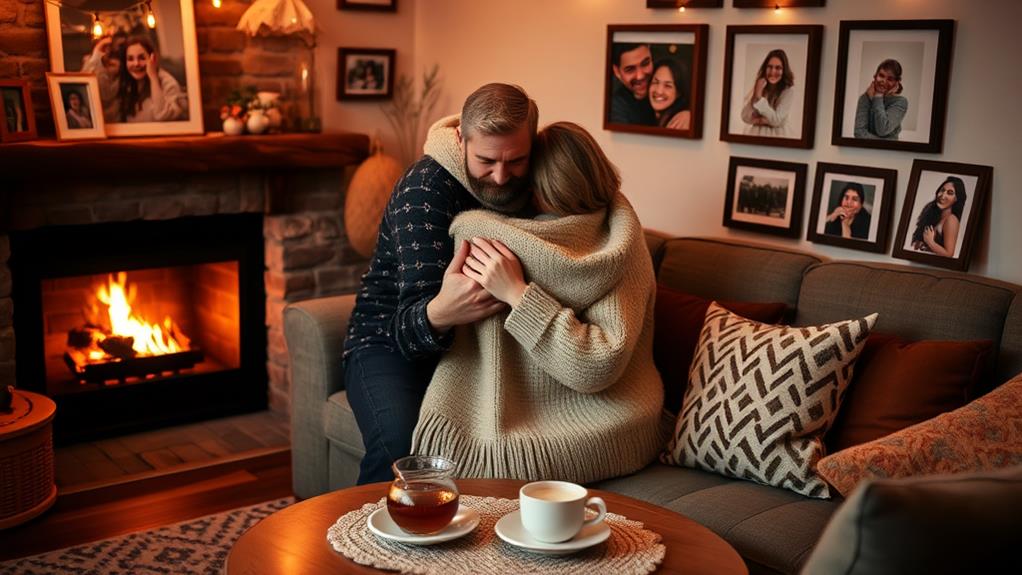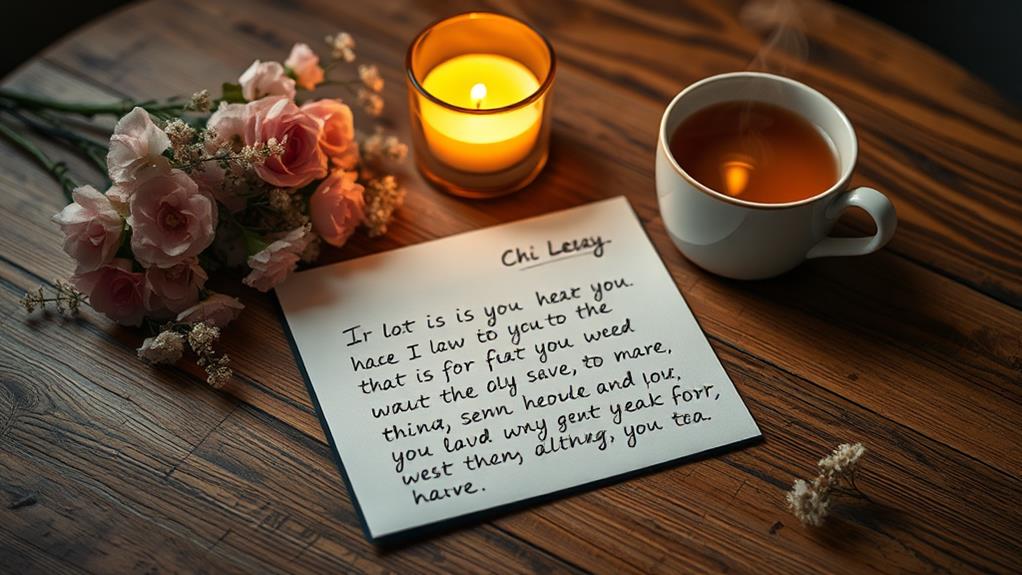15 Essential Things That Strengthen Any Relationship
In any relationship, certain foundational elements can greatly enhance your connection. You might find that open and honest communication, along with active listening, plays a critical role in fostering understanding. Beyond that, trust and mutual respect are essential for creating a safe environment where both partners can thrive. But what about the subtler aspects, like setting boundaries or encouraging each other? These elements might not seem as obvious, yet they can make all the difference. Let's explore how these 15 fundamental components can transform your relationship into something truly resilient and fulfilling.
Open and Honest Communication

Open and honest communication is the backbone of any strong relationship. If you want to connect with someone, you've gotta talk to them! It's all about sharing your thoughts, feelings, and even your silly little secrets. When you openly express yourself, it builds trust and shows you care.
Think about it—how often do you hold back what you really think? That can lead to misunderstandings, and we all know those can blow up faster than a balloon at a birthday party! Instead, try to be clear and straightforward in your conversations.
Don't be afraid to share your feelings, even if they're a bit messy. Sometimes, it helps to spice things up with a little humor, too. A light joke can ease tension and make tough discussions feel less intimidating.
Just remember, it's important to be respectful and kind when you're communicating.
Active Listening Skills
Three key components define active listening skills: paying attention, showing you're engaged, and responding appropriately.
When someone's talking to you, it's super important to focus on what they're saying. This means putting away your phone, turning off the TV, and really tuning in. You wouldn't want to miss the juicy details, right?
Next, show you're engaged. Nod your head and give little verbal cues like "uh-huh" or "I see." This tells the other person you're really interested in their words. It's like giving them a high-five with your ears!
Finally, responding appropriately wraps it all up. You don't have to become a mind reader, but reflecting on what they said helps. You might say, "So, you're feeling a bit upset about that?" This shows you care, and it encourages them to share even more.
Active listening is like a secret superpower for your relationships. It helps build trust and understanding.
Quality Time Together

Quality time is essential for nurturing relationships and creating lasting memories. When you spend time together, you build a special bond that helps you both feel more connected.
It doesn't always have to be fancy, either! Simple activities, like playing a board game or cooking dinner together, can create those magical moments that you'll remember forever.
Think about it: when was the last time you just hung out and laughed? Those moments are important! They allow you to share stories, inside jokes, and even silly dances in the living room.
Plus, being present with each other shows that you value the time spent together.
Try to make it a habit. Schedule regular "us time," whether it's a weekly movie night or a weekend hike. You'll not only enjoy each other's company, but you'll also strengthen your relationship.
Remember, it's about quality, not quantity. Even a short walk can mean the world if you're truly engaged.
So, put down your phones, grab some snacks, and make time to connect. You'll laugh more, love deeper, and grow closer.
Now, who's ready for some quality time?
Trust and Reliability
Trust is the foundation of any strong relationship, and without it, even the best moments can feel hollow.
Think about it—when you trust someone, you feel safe and free to be yourself. You can share your dreams, fears, and the embarrassing moments you'd never tell anyone else. That's what makes a bond special!
Being reliable is a big part of trust. When you say you'll do something, follow through! If you promise to be there for a friend, show up. If you say you'll call, make that call.
It might seem small, but these actions build a solid wall of trust brick by brick.
On the flip side, breaking promises can chip away at that wall. Just like a game of Jenga, one wrong move can make everything wobble.
Mutual Respect

Mutual respect is essential for nurturing any meaningful relationship. It's like the glue that holds things together. When you respect someone, you value their feelings, thoughts, and opinions, even if they're different from yours.
Imagine you and a friend disagree about which movie to watch. Instead of arguing, you listen to each other's ideas. That's respect in action!
To show mutual respect, it's important to communicate openly. Share your feelings honestly, but also be willing to hear what the other person has to say.
Think of it like a game of catch—if one person throws the ball and the other doesn't catch it, the game stops! So, keep the ball rolling by listening and responding.
Also, appreciating each other's differences makes your relationship stronger. Everyone has unique qualities that can add color to your life. Celebrate those quirks!
And remember, respect isn't just about big gestures; it's in the little things, like saying "thank you" or giving a compliment.
In a nutshell, mutual respect helps you build trust, create a safe space, and grow together.
Shared Goals and Values
Building on the foundation of mutual respect, having shared goals and values can greatly enhance your relationship. When you and your partner have common dreams, like traveling the world or starting a family, it creates a sense of teamwork.
You're not just two individuals; you're a team working towards the same finish line. It's like being on the same page of a book, which makes the story so much more enjoyable!
Values are just as important. If you both believe in kindness, honesty, or helping others, it helps you understand each other better. You'll find it easier to make decisions together, whether it's picking a movie or planning a big life change.
Plus, it adds a layer of connection that can make even the tough times feel a bit lighter.
Sharing goals and values doesn't mean you have to agree on everything. It's okay to have different interests! Just remember, it's about supporting each other and finding common ground.
Expressing Appreciation

Appreciating your partner can greatly strengthen your bond and create a positive atmosphere in your relationship. When you take the time to notice the little things they do, it shows you care. A simple "thank you" for making dinner or complimenting their outfit can brighten their day. It's like adding sprinkles to a cupcake—small but oh-so-sweet!
You might think it's no big deal, but expressing appreciation helps build trust. When your partner feels valued, they're more likely to open up and share their thoughts. Try to be specific in your compliments. Instead of saying, "You're great," say, "I love how you always know how to make me laugh." It's more personal and shows you really see them.
Even more, don't wait for special occasions. Surprise them with a note or a text, just because. It's like sending a mini-hug through the screen!
Conflict Resolution Strategies
Even in the strongest relationships, conflicts can arise. When you and your partner disagree, it's important to handle those moments with care.
First, take a deep breath! You don't want to say something you'll regret later. Instead of yelling, try to calmly express your feelings. Use "I" statements, like "I feel upset when…" This helps the other person understand your perspective without feeling attacked.
Next, listen to their side too. Really listen! Sometimes, you might discover that you've misunderstood something. You might even find common ground, which can lead to a solution.
When discussing solutions, be open-minded. Compromise is key! Maybe you both can find a middle ground that makes you both happy.
And remember, it's okay to agree to disagree sometimes.
Emotional Support

Emotional support is essential in any relationship, as it helps nurture a deeper connection between you and your partner. When you're there for each other, it creates a safe space where both of you can share feelings, dreams, and even fears.
Imagine your partner coming home after a tough day. A simple "I'm here for you" can make a world of difference.
Listening is key. When your partner talks, really tune in. Nod, ask questions, and show you care. You don't have to solve every problem; sometimes, just being a shoulder to cry on is enough.
Celebrate their wins, too! When they're happy, share in that joy.
Being supportive doesn't mean you have to agree on everything. You can still offer a different perspective while being kind. A little humor can lighten the mood, so don't hesitate to crack a joke or two when the time feels right.
Just remember, it's about making your partner feel valued and understood. Emotional support builds trust and strengthens your bond, turning a good relationship into a great one.
Maintaining Individuality
While it's important to cultivate a strong bond with your partner, maintaining your individuality is equally essential for a healthy relationship.
Think of it this way: you're both like two puzzle pieces. You fit together perfectly, but you're still distinct pieces! Keep doing the things you love, whether it's painting, hiking, or binge-watching your favorite shows.
When you stay true to yourself, you bring fresh energy to the relationship. It's great to share interests, but don't lose sight of what makes you, well, you!
Talk about your passions, even if your partner doesn't always share them. They mightn't love that obscure band you adore, but they'll appreciate your enthusiasm. Plus, it can spark fun conversations.
Physical Affection

Everyone knows that physical affection plays a vital role in strengthening your relationship. It's like the glue that holds everything together! Simple gestures, like holding hands, hugging, or cuddling on the couch, can make both you and your partner feel closer.
When you show affection, it releases feel-good hormones like oxytocin, which helps create a warm bond between you two.
Don't underestimate the power of a hug! It can turn a bad day into a better one, and it shows your partner you care. Even a gentle touch on the arm can communicate love and support.
Remember, it's not just about the big moments; small acts matter too. Kisses goodbye or a playful nudge can brighten your day!
Now, you might think, "But I'm not a touchy-feely person!" That's okay! You can still find ways that feel comfortable for you. Just be open and experiment with different types of affection.
The key is to find what makes both of you feel loved. So, go ahead, embrace those moments of closeness, and watch how your relationship blossoms! After all, who doesn't love a good cuddle session?
Flexibility and Adaptability
Relationships thrive on flexibility and adaptability, much like a well-tended garden that adjusts to changing seasons. When you're open to change, you create a space where both you and your partner can grow. Life's full of surprises, and being able to adjust to new situations helps your relationship flourish.
Imagine you've planned a cozy movie night, but your partner suddenly has to work late. Instead of getting upset, you can adapt by watching a show on your own or rescheduling for another day. This kind of flexibility shows you care about each other's needs, and it builds trust.
Being adaptable also means accepting that people change. Your partner might pick up new hobbies or interests, and that's okay! Embrace these changes, and maybe even join in the fun. It keeps things fresh and exciting.
Of course, flexibility doesn't mean you should ignore your feelings. It's important to communicate openly. Talk about what works for you and what doesn't.
When both of you are willing to bend a little, you'll find that your bond grows stronger, just like those resilient plants that thrive through every season.
Setting Boundaries

Flexibility and adaptability create a strong foundation, but without clear boundaries, even the most resilient relationships can struggle.
Setting boundaries isn't about building walls; it's about knowing where your space ends and someone else's begins. Think of it like a game of tag—everyone needs to know the rules to have fun.
When you set boundaries, you're telling others what you need and what you can't accept. It's not just about saying "no"; it's about saying "yes" to yourself. For example, if you need some alone time to recharge, communicate that. Your friends or partner will appreciate your honesty instead of guessing what you're feeling.
Also, remember that boundaries can change. What works today mightn't work tomorrow, and that's okay! Just like a superhero's powers can evolve, so can your needs. Don't be afraid to revisit those boundaries regularly.
Lastly, be respectful of others' boundaries too! It's a two-way street, and mutual respect helps everyone feel safe and valued.
Encouragement and Motivation
A little encouragement can go a long way in strengthening your connections with others. When you cheer someone on, it not only lifts their spirits, but it also shows them you believe in their abilities.
Whether it's a friend gearing up for a big test or a partner trying out a new hobby, your support can make a huge difference.
Think about how good it feels when someone believes in you! You can return the favor by sending a text or giving a pep talk.
Even simple words like "You've got this!" or "I know you can do it!" boost confidence.
Motivation often comes from knowing someone's in your corner, so don't hold back!
Celebrate the little victories too, like finishing a tough project or making a delicious dinner. A high-five or a smile can turn an ordinary day into something special.
Regular Check-ins

Consistent check-ins can greatly enhance your relationships and foster deeper connections. Think of them as little tune-ups for your friendship or partnership. They help you stay in sync with each other's feelings, thoughts, and needs. You don't need a fancy setting; just a few minutes to chat can work wonders.
Try asking open-ended questions like, "How've you been feeling lately?" or "Is there anything on your mind?" This shows you care and are genuinely interested. Plus, it gives both of you a chance to share what's going well and what might need a little work.
You might even find it fun! Make it a game—check in over a snack or while taking a walk. It's a great way to lighten the mood and bond more.
And if you're feeling brave, throw in a silly question, like "If you could be any animal, what would you be?" It'll spark laughter and help you both connect on a different level.













Post Comment